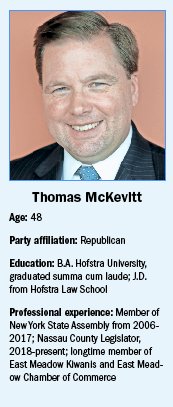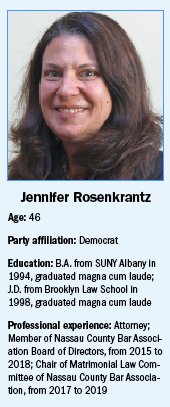Rosenkrantz challenges McKevitt for L.D. 13 seat
Incumbent County Legislator Thomas McKevitt, a Republican of East Meadow, is running for re-election to represent the 13th legislative district after serving his first term when he was elected in 2017. Before that, he represented the 17th State Assembly District for six terms. Challenging him is Jennifer Rosenkrantz, a Democrat from East Meadow and attorney.
The 13th legislative district includes East Meadow, Salisbury and parts of North Bellmore, North Merrick and North Wantagh. The Herald asked both candidates a series of questions on the issues.
Herald: Why are you running for this position and what are some of your goals for the 13th legislative district?
McKevitt: I believe I have had a record of service to the community both in my time with the New York State Assembly, and currently with the Nassau County Legislature. My office has been active in providing numerous programs, whether it be car seat safety checks, flu shots for seniors, mammograms and prostate cancer screenings. I have been accessible in holding town hall meetings, and forums focusing on public safety and reassessment.
I voted for the lowest middle-class income tax rate in decades, and holding the line on County property taxes. I was able to obtain State funding for paving additional sections of Prospect Avenue and have supported the County capital plan which will provide for paving Carmen Avenue at this time, and Merrick Avenue in the near future.
I hope to increase the number of roadways to be repaved, which will not only improve safety, but also put people to work. However, it is most important that we keep Nassau County as affordable as possible so our residents can remain to live in the area.
Rosenkrantz: I am running because it is time to change the “pay to play” mentality that has pervaded our local government for too many years. People in Nassau County deserve good, fair government and representatives who do not rely on favors and nepotism. I understand that the public feels cheated by corruption and that, if elected, I will have to work hard to regain the public trust. I am willing to do that. I am concerned that young people, my children included, will not want to or will not be able to live in Nassau County unless things change. I want to be part of that change.
Herald: What are your thoughts regarding the County Executive’s property tax reassessment plan and how it has been handled by both parties?
McKevitt: There is no argument that a reassessment needed to be conducted and was long overdue. I believe the county executive and the assessor did a poor job in rolling out the process and explaining it to the public. I received many phone calls at my office from taxpayers who were confused and nervous as to how this would affect their ability to stay in their homes. I decided to personally conduct a number of community forums explaining the reasons why the process was occurring and the necessity for it. The number one question I was asked was “how did the County come up with the value for my house?” The comparable properties the Assessment Department used in arriving at the values was on the “mynassauproperty.com” website, but this was not clearly explained to the public.
I believe my caucus responded appropriately to the issue by forcing the administration to send out tax impact notices, which gives taxpayers a clearer picture on how the reassessment will affect them. This began the exploration of alternatives, such as a phase-in plan to mitigate the affects of a drastic tax increase. We must continue to strive for transparency to give the public confidence in the system.
Rosenkrantz: I fully support the County Executive’s reassessment plan. The taxpayers in Nassau County have been the victims of an artificial assessment system implemented by the prior administration under Ed Mangano, which has created an unrealistic system by which homes are valued. As a result, the assessment system, and in turn, our real estate taxes were skewed as virtually no one’s home was accurately and properly assessed until the county executive implemented reassessment. When Ed Mangano froze the tax rolls for seven years (2011-2018), it created a “separate and unequal” tax assessment and challenge system that automatically and without any basis in reality benefited those who frequently challenged their annual property tax assessment over those who did not do so. Our current county executive immediately acted to fix this problem by unfreezing the tax rolls and signing legislation to allow the reassessment of all Nassau County properties. She additionally introduced a proposal calling for a five-year phase in of any tax changes as a result of the reassessments. This way, those whose taxes will increase — because their homes are now being properly valued — will have a five-year transition period. In addition, the reassessment will help restore financial stability to Nassau County.
The Republican legislative majority has stalled the county executive’s plan in a political maneuver. There is no legitimate reason that I am aware of to prevent the proper assessment of homes in Nassau County so that everyone is paying his and her appropriate taxes based on the real value of their homes. There is no legitimate reason that I am aware of to prevent a five-year phase in of the tax changes to help those whose taxes may be (properly) increasing. Unfortunately, the Republican majority has made the issue of fair assessments and taxes a partisan issue, which does not help the taxpayers at all.
Herald: What are your hopes for the Nassau Hub development plan and how do you plan to get involved in its completion as legislator?
McKevitt: I am a member of the County’s HUB Advisory group and I am co-chair of the subcommittee on transportation and infrastructure. We have had several meetings on how to integrate the HUB Development into the local community, and have had presentations on innovative automated transportation systems that are already in place in communities through the country. I am optimistic that this builder has the experience in accomplishing realistic development, but also has the vision to bring a transformative project necessary to obtain funding from New York State which will allow parking facilities to be constructed. I will continue to be actively involved in the process so a site that will enhance the region will be constructed.
Rosenkrantz: How can anyone not support the Nassau Hub development plan — jobs, economic stimulus, workforce housing, new tax revenue, improved transportation. These are all the things that Nassau County residents want to see and deserve. I will fully support all legislation that brings the development of the Hub closer to completion. Again, this is not and should not be a partisan issue. The Hub development is good for all of Nassau County, not just one political party or another.
Herald: What are your ideas for creating more affordable housing and keeping young people and new families in Nassau County?
McKevitt: Over the past decade, New York State has led the nation in the emigration of citizens leaving the state. Nassau County has had its share of its children, who receive an excellent primary and secondary education, only to leave for college out-of-state and never return due to the lack of affordable housing opportunities. The development at the Coliseum site will include 500 apartment units, which the builder is considering utilizing as “dorm-style” living which would encourage young people to reside at the site and stay in the region. We should explore innovative arrangements in other areas of the County, such as at transit centers. Realistically, there are fewer properties available in Nassau County as compared to Suffolk, where new housing could be built. We must work on a regional basis so we can keep our most precious resources here.
Rosenkrantz: We need vibrant downtown areas and workforce housing near train stations and bus stations. We need to promote our excellent school districts to attract young families to Nassau County. We need to improve our public transportation system – more parking, better service, increased access to transportation, and coordination of all public transportation (bus and train). I would also love to see legislation that provides for financial literacy for our middle school and high school students. Providing for financial literacy at an early age will allow young people to understand how a home can be purchased and maintained. Young people can learn how to budget, how to reduce expenses, how to allocate their available funds and how to function as a financially savvy adult.

 41.0°,
Fair
41.0°,
Fair 







